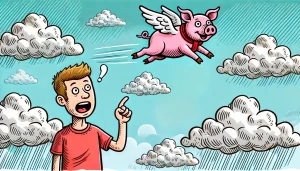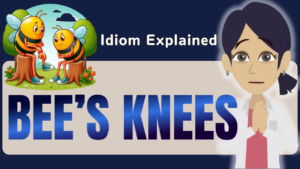Ever wondered why people laugh when someone promises something “when pigs fly”?
Something that is impossible or extremely unlikely to ever happen; used to express strong skepticism that a stated event will occur.
The first time I heard “when pigs fly,” I momentarily pictured winged farm animals soaring through clouds.

This playful idiom transforms ordinary conversations by humorously indicating something is impossible.
In this blog, we’ll explore its meaning, historical roots, and practical examples to help you use it confidently.
Whether you’re expanding your vocabulary or connecting with native speakers, understanding figurative expressions like this one is essential for natural English fluency.
Join me as we discover how this quirky phrase can add color to your conversations and help you navigate English’s more creative aspects.
Quick Look: ‘Pigs Fly
Meaning and Context
The idiom “when pigs fly” refers to something that is practically impossible or highly unlikely to happen.If someone says, “I’ll believe that when pigs fly,” they are highlighting deep skepticism or disbelief toward a proposed idea or event.
Historical Roots
Some linguists suggest that variations of this idiom date back to the 1600s.
Its enduring popularity stems from the whimsical imagery of a creature doing something completely outside the realm of possibility.
Note on Accuracy
Because the phrase has evolved over centuries, exact origins can be difficult to pinpoint.
However, its intended meaning of expressing “that will never happen” has remained consistent through different eras and regions.
A Common Pitfall
New English learners often wonder if it might ever be used literally.



Remember, ‘when pigs fly’ is purely figurative. Don’t expect anyone to discuss actual flying livestock – it’ll cause confusion!
Avoiding Overuse
While “when pigs fly” is fun and easy to remember, using it too frequently might dull its humorous impact.
Substituting with similar expressions, such as “when hell freezes over,” helps maintain variety and keeps your speech lively.
Real Examples & Stories
Two lines per example help illustrate how “when pigs fly” functions in practical contexts:
- Workplace Scenario
- “My manager said she’d give me a promotion when pigs fly.”
- This means the manager does not believe a promotion is likely at all.
- Humorous Twist
If you misunderstood the phrase, you might wait around for a promotion that will never come.
Recognizing idiomatic language will save you from unrealistic expectations.
- Travel Ambitions
- “I’ll quit my job and travel the world when pigs fly.”
- Here, the speaker is emphasizing that taking a worldwide trip is currently not a realistic goal.
- Why It Matters
If you took this literally, you might plan a big farewell party, only to discover they were never truly serious.
- Family Promise
- “Our father said he’d buy us a fancy new gadget when pigs fly.”
- This suggests the parent believes the children’s request is impractical or unwarranted.
- Story Variation
In some tales, the child works extra hard to prove the impossible is possible, and the family ends up sharing a memorable lesson.
Through these scenarios, you can see how “when pigs fly” injects humor but also sets clear boundaries around someone’s skepticism.
In real-life communication, recognizing these hints will protect you from taking statements at face value.
Short Story Example
Imagine a farmer who casually tells his child: “You can have a pet pig when pigs fly.” The child takes this as a genuine promise, working tirelessly to excel in every responsibility at home.
Eventually, the child returns triumphantly with top-notch results, expecting a reward. The farmer, however, never meant to fulfill this agreement because, from his perspective, pigs simply do not sprout wings.
This miscommunication highlights how easily idioms can cause confusion if someone does not know the figurative meaning.
For anyone learning English, such stories underscore the importance of cultural familiarity with phrases like “when pigs fly.”
Similar & Opposite
Similar Idioms
- When hell freezes over: Conveys that something is never going to occur, as hell is traditionally depicted as perpetually hot.
- When the sun rises in the west: Suggests the event in question is contrary to the normal laws of nature, hence impossible.
- When the cows come home: Indicates waiting for a very long time, so long that it is essentially improbable.
These variants all capture the feeling that something is out of reach or unrealistic. They enrich your vocabulary by allowing different ways to express disbelief or impossibility.
Opposite Idiom
- In the blink of an eye: Suggests something will happen almost instantly, which stands in direct contrast to the impossibility implied by “when pigs fly.”
- Using such contrasting phrases helps you emphasize sudden occurrences as opposed to events that will never happen.
Idioms can be viewed as cultural shorthand, revealing shared references and assumptions within a community. A solid knowledge base of both similar and opposite expressions will broaden your ability to communicate nuanced thoughts.
Cultural Fun Facts
Many languages have a comparable phrase that echoes the idea of “pigs flying.” This global presence shows how humor and skepticism often intermingle across cultures.
Some references claim there is a children’s book titled When Pigs Fly, captivating young readers with the idea of defying limitations.
Though details vary, the playful nature of this concept endures in literature, cartoons, and everyday speech.
Festival Reference
It has been noted that Ohio hosts creative events with pig-themed elements.
Musical Connection
Some fans might discuss songs humorously titled or themed around “pigs flying.”
Regardless of exact references, these anecdotes illustrate how the idiom continues to spark creativity. It appears in storytelling, celebrations, and artistic endeavors far beyond simple day-to-day usage.
Avoiding Confusion
“When pigs fly” might sound peculiar if you have never encountered it.
In everyday conversation, it can lead to incorrect assumptions if you take it literally.
Key Tip
If someone uses this phrase, they are usually dismissing the idea as impossible or sarcastically stating it is highly unlikely. Responding as if they made a sincere promise can cause awkward moments.



Always pay attention to tone, context, and gestures. If someone sounds playful or doubtful, they’re likely using an idiom.
By honing your ability to detect figurative speech, you can avoid confusion and interact more confidently. This proficiency is especially valuable in professional settings, where clarity and understanding are crucial.
Must-Know Idioms List
Learning idioms is a powerful step toward fluency. Below are other expressions that complement the skeptical humor of “when pigs fly.”
- The Ball is in Your Court
- Meaning: You are now responsible for deciding or taking action.
- Why It’s Useful: It clarifies who must move the discussion or project forward.
- Break a Leg
- Meaning: A playful way to wish someone good luck, particularly in performance settings.
- Why It’s Useful: Demonstrates cultural fluency and shows encouragement without sounding too formal.
- Piece of Cake
- Meaning: Refers to something that is extremely easy to accomplish.
- Why It’s Useful: Ideal for describing tasks that require minimal effort, balancing out the impossibility suggested by “when pigs fly.”
Embracing a variety of idioms allows you to express yourself more naturally in diverse situations. It also cultivates a richer understanding of English-speaking cultures around the world.
Add Humor to Speech
Certain idioms create instant camaraderie when shared among people familiar with them. “When pigs fly” is an excellent example because it sparkles with wit and invites people to lighten a serious topic.
If a friend complains about a chore, you might jokingly promise to help “when pigs fly” to convey that you are not exactly keen on the task.
The humor can defuse tension or show that the idea is, in your view, a long shot.
Nevertheless, always judge the environment before using an idiom meant to poke fun. In more formal or sensitive contexts, misunderstandings can arise if the listener is unfamiliar with the expression.
Motivational Angle
Interestingly, “when pigs fly” can sometimes inspire people to prove that impossible-seeming goals are reachable.
A person might declare, “I’ll pass that challenging exam when pigs fly,” only to turn around and work relentlessly to succeed.
That victory can feel even sweeter when contrasted with initial doubt. While the idiom is meant to describe improbability, it can spark determination and highlight an individual’s passion to overcome barriers.
In some cases, the desire to counter the “never going to happen” stance pushes people to aim higher. They want to show that even what seems outlandish might be in grasp if one remains persistent and resourceful.
Pop Quiz: Check Your Idiom Skills
When Pigs Fly

Conclusion
1. Core Meaning: “When pigs fly” humorously highlights an event or situation that will never occur in reality.
Visualizing an airborne pig underscores its sheer impossibility.
2. Practical Use: Sprinkle it into discussions about proposals or dreams you think are infeasible.
Doing so lends a playful but clear sense of doubt.
3. Cultural Insight: The idiom appears in various forms across different regions, reflecting a shared human penchant for wry humor. Its universal appeal stems from our collective delight in imagining the absurd.
4. Learning Tip: Pair “when pigs fly” with related idioms to enrich your communicative range.
Alternating phrases like “when hell freezes over” keeps your speech dynamic and engaging.
By incorporating idioms, your English conversations become more vibrant and expressive. Let this phrase remind you that language can be as colorful and imaginative as you allow it to be.
Feel free to apply these examples, create your own scenarios, and reflect on times you have encountered skeptical remarks.
In doing so, you will not only grasp the idiom but also embrace a deeper understanding of how humor and figurative language shape everyday communication.
When you unlock the power of “when pigs fly” and its counterparts, you will find fresh ways to express disbelief, encourage motivation, and add a spark of fun to conversations.
Let your creativity soar, even if pigs never actually do.









Comment